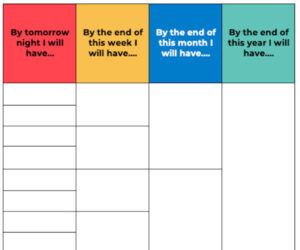US News
8 tips to keeping your English level after studying in London
Published
1 year agoon
By
Admin
So, you’ve finished your studies in England and you’re going back home where you will be speaking your own language again. Saying goodbye to friends and making a life change can be difficult but just because you’re home doesn’t mean you can’t still keep your English skills! Here are some tips to help you maintain your English level from the comfort of your own home.
1. DON’T LOSE FRIENDSHIPS
Don’t forget the friends you made here in London! Nowadays, it is easy to WhatsApp, video call, email your friends to keep up with all their news. This is especially useful for your English if you have friends from your class from a different country to you. You could even arrange to meet up with your friends in a different country!

2. FIND NATIVE SPEAKERS IN YOUR CITY
Most cities have cafes or bars where you can take part in a language exchange. There is probably one in your home town or city! Go on google and find one. At a language exchange you can meet people from your country wanting to learn English and you can help English speakers who want to learn your language. Some meet-ups are for people looking to make new friends and some might be for locals. It is a good chance to relax and socialise in a friendly environment while improving your skills. You can also swap advice on language-learning websites, materials and events!

3. ONLINE ENGLISH LESSONS
Studying online is another fantastic option for maintaining your English level as it is flexible to fit in with your work and family life. West London English School offers a wide range of classes online via our own platform.
Just log in and join the class!
- General English morning, afternoon and evening
- Business English
- FCE and CAE
- IELTS
- OET
What are the benefits of studying online? Well, you can help save the environment by not travelling, it is just like a classroom with a white board and you can talk with other students in our breakout rooms and….you can wear your pyjamas!
4. LISTEN TO PODCASTS, RADIO AND MUSIC IN ENGLISH
As you move home and no longer hear English as much as you used to, it can be demotivating to feel your listening skills getting worse. Don’t worry! Listening it podcasts, radio and music is a really fun and useful way to keep those skills up. There are lots of free materials online; here are some recommendations:
BBC 6-minute English is great for lower levels.
BBC Soundsgives you access to hundreds of radio programmes and interviews with influential people such as Meryl Streep and Bill Gates.
Luke’s English Podcastis perfect for people who love to laugh as they listen!
If you love music, Lyrics Traininggives you activities to complete while listening to British and American music. You can download it as an app!

5. WATCH TV, FILMS AND VIDEOS IN ENGLISH
Watching TV, films and videos in English is a great way to improve all your language skills. Netflixis fantastic with a wide range of TV shows, films, documentaries etc. and you can choose to watch with or without subtitles. Not only does it improve your listening skills, but you can also pick up new vocabulary. Make sure you write it down, look it up in a dictionary, practising saying it and then try to use it!
Ted Talks are also interesting and useful. They are short videos of 5-20 minutes and cover a range of topics such as nature, science, psychology, history, theatre etc.
A good website for low levels with very short videos, is Newsround
Watch interviews with adults and children and hear the news in interesting way with clear English.

6. USE SOCIA
L MEDIA
Change your phone language to English! You can also log in to Instagram, Facebook, Twitter, TikTok and in settings, change the language. Then, every time you use your phone you’ll be able to see English. You will still be able to see statuses and posts in your language too by pressing see translation. Your addiction to social media might be a benefit to you! If you like English pages such as West London English School you will see quizzes, statuses, videos and blog posts in English every day.

7. MAKE A STUDY PLAN
A study plan helps you to see your goals and make them a reality! Try to set a weekly goal such as learn 10 new words, or a monthly goal, watch 1 season of a TV show you like in English or read 3 chapters of a book in English!

8. PLAN A TRIP

Travelling is probably the most exciting thing you can do now that you speak English!
Practice reading skills by researching your destination in English, book your flights and hotel using websites in English.
Practice writing skills by keeping a journal or writing reviews of the places you visit.
Practice speaking and listening in English with locals, such as: giving opinions, being emphatic, asking and giving directions, telling stories, giving recommendations, describing things and summarising details
You may like

Efficient ACA Compliance Management with ACA-Track

Key Software Systems: Future-Proofing Courier Operations with Technology

Refrigerated Trailers: Benefits and Uses

100 Dynamic Duos: Legendary Pairings That Transcend Time
ARK: Survival Evolved Game Icons and Banners

cute:i1cdycptg50= drawings

Understanding New York Sports Club Membership: What It Offers and What Affects the Cost

Safety Tips for Compressed Air Dryers

drawing:23vyczbybxu= billie eilish

drawing:056aoyw74ce= rick and morty

How can online food delivery sales increase and attract the maximum number of customers in 2023?

MEP BIM: Revolutionizing Building Infrastructure Design

Revolutionizing Industries with ChatGPT

Resolving the Israeli-Palestinian Conflict: A Comprehensive Analysis

Skillful Passion: Wisconsin’s Dominant Volleyball Team

Virtual Reality Rental: A Futuristic Experience

Unlocking the Potential of cryptonewzhub.com Internet

Negin Behazin vs Dignity Health: Comprehensive Comparison

Unraveling the Mystery: Robert Card’s Tragic Passing

iPhone 14 Pro Max: Unveiling the Next Level Innovation

Efficient ACA Compliance Management with ACA-Track

Key Software Systems: Future-Proofing Courier Operations with Technology

Refrigerated Trailers: Benefits and Uses

100 Dynamic Duos: Legendary Pairings That Transcend Time
ARK: Survival Evolved Game Icons and Banners

cute:i1cdycptg50= drawings

Understanding New York Sports Club Membership: What It Offers and What Affects the Cost

Safety Tips for Compressed Air Dryers

drawing:23vyczbybxu= billie eilish


